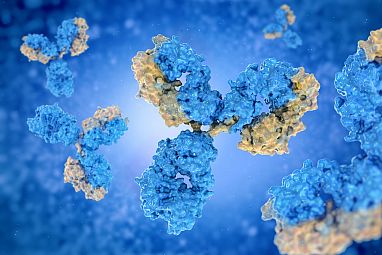Answer, 1 quintillion or 1,000,000,000,000,000,000 or 10^18 according to a team led by Drs. Bryan Briney and Dennis R. Burton at Scripps Research examined antibody-producing B cells isolated from blood samples of 10 people between the ages of 18 and 30. ... Additional studies are needed to more accurately determine the full scope of the human antibody repertoire
:
The body’s immune system helps prevent or limit infection. One way the body fights foreign invaders, like bacteria and viruses, is by making antibodies against them. An antibody is a Y-shaped protein that’s produced by white blood cells (B-lymphocytes). It’s made of two identical “arms,” each of which has a heavy chain and a light chain. Together, these create specificity for an antigen (the substance that’s causing an immune response).
If our germinal B-cells, the newly minted ones made in our bond marrow, didn't go through this hypermutation process, we wouldn't be able to make all these different antibodies. As we learn when we have a diagnosis of CLL, having 'mutated' CLL cells correlates with a longer time to treatment and longer remission times. That fits in with the general observation that B-lymphocyte cancers vary from acute through to chronic, depending on when in the B-cell lifecycle the cancer develops. The IGHV mutation status test measures to what degree the CLL cells vary from the germinal cell line. With FCR, quite a few patients go on to have very long remission times of well over 10 years if they are 'mutated', i.e. the cancerous clonal cells developed after the B-cell went through the hypermutation stage.
from Decoding the variety of human antibodies - NIH
nih.gov/news-events/nih-res...
Illustration of antibodies, with heavy chains in blue and light chains in white. Imae courtesy of Svisio / iStock /Thinkstock
Neil
